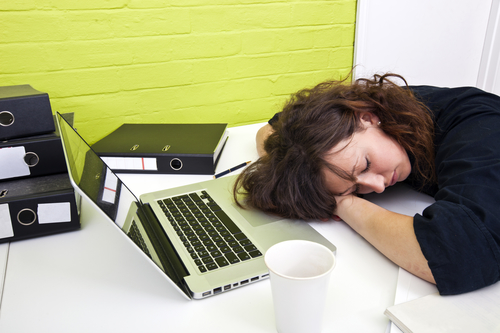by Veronica Vaiti, LCSW-R
 Do you get enough sleep? Do you wake up feeling refreshed and happy or groggy and grumpy? Have you had to miss work or school or a fun life event because you barely slept the night before?
Do you get enough sleep? Do you wake up feeling refreshed and happy or groggy and grumpy? Have you had to miss work or school or a fun life event because you barely slept the night before?
Sleep Deprivation is named as one of the top public health epidemics by the Centers for Disease Control, and sleep deprivation can have devastating effects across all aspects of our lives including physical health, mental health, daily functioning (think driving a car or paying bills), work and school performance, relationships and our overall quality of life.
Roughly 40% of American Adults are carrying a sleep debt, meaning they don’t get the recommended 7-8 hours of sleep per night. Although there are a few people who are able to function well on less than the recommended averages, many of us who don’t sleep enough suffer greatly and/or somehow adjust to functioning less optimally.
There are two types of disturbances to sleep…
- Disturbances to the amount, quality or timing of our sleep are known as Dyssomnias (ex. insomnia)
- Abnormal movements, behaviors, emotions and perceptions during sleep are known and Parasomnias, (ex. sleep walking)
Disturbances to sleep usually stem from either external situations and unique circumstances such as having a new baby or living in a loud environment, or from our internal/biological and/or emotional states such a incessant worry, doubt and anxiety, chronic illness or having a sleep disorder.
The most common types of sleep disorders are:
- Primary Insomnia – difficulty initiating or maintaining sleep
- Narcolepsy– a neurological disorder that results in poor control over sleep-wake cycles and extreme drowsiness during the day
- Sleep Apnea – breathing anomalies during sleep in which the breathing cycle repeatedly stops and starts
- Circadian Rhythm Disorder – disruptions to our internal body clock that manages our sleep-wake cycle over a 24 hour period
- Restless Leg Syndrome – a neurological disorder characterized by throbbing, aching, pulling or other painful leg sensations that present primarily at night when someone is trying to rest or sleep
- Night Terrors and Sleep Walking – episodes of screaming, intense fear or flailing about while falling asleep; usually paired with sleep walking which includes walking or performing other complex behaviors while sleeping
And for the 50-70 million US adults who have a sleep disorder, this lack of quality sleep can be all encompassing and critically impair their
functioning and overall health and well-being as well as impact the lives of those around them. Sleep deprivation effects everyone one way or another.
Some interesting facts you may not know about sleep deprivation:
- Sleep deprivation vs. starvation…it takes 2 weeks to starve to death, but 10 days straight of no sleep can kill you
- Sleepiness-related motor vehicle accidents have a fatality and injury level similar to addiction-related accidents
- A lack of sleep has a direct effect on our mood and chronic insomnia can result in and is often linked to an anxiety or depressive mood disorder, chronic diseases such as hypertension, diabetes, obesity and increased likelihood and developing cancer
- Sleep deprivation accelerates aging, induces feelings of insecurity, decreases feelings of attraction and sex drive and increases marital and relational discord
- Snoring is a major indicator of obstructive sleep apnea
If you’re running a sleep dept either because you suffer a sleep disorder or because you are encountering a situation that is cramping your sleep style, here are some tips for what to do and what not to do:
DO…
- Take a cat-nap of at least 10-20 minutes during daylight hours
- Seek medical care, especially if you suspect you suffer from a sleep disorder
- Try to plan a night/day that will allow you to go to bed much earlier and sleep much later to make up for the difference and credit some hours of zzzzz’s to your overall balance
- Practice relaxation techniques to help soothe your nervous system and mind
- Minimize and reassign your tasks and to-do lists and cut down the need to have to be behind the wheel of a car and drive
- Avoid potentially prickly situations and people as best you can
- Seek support, especially if a new parent, ask trusted others to come and help lend a hand so you can take a nap
DON’T…
- Make important decisions while sleep-deprived
- Go shopping, grocery or otherwise, if you can avoid it. Sleep debts result in poor judgment which can result in unusually high shopping bills
- Pick a fight or attempt to engage in an important discussion with another
- Try to push through and overdo things, over-schedule yourself or take on too much excessive responsibility, you will only continue to pay the price.
- Try to go it alone, seek support
Additional Helpful Tips for Improving Your Sleep Hygiene:
- Cut down consumption of or even eliminate caffeine, alcohol and sugar from your diet, especially 6-8 hours prior to your bedtime
- Cut down and monitor your consumption of technology including TV, computer, smartphone and anything that requires you looking at a screen at least 1 hour before your bedtime.
- Arrange your bedroom and sleep environment in a way that provides a soothing and comforting space that he reserved solely for sleep and relaxation purposes – calming colors and designs, sound machines, and black-out curtains are all welcome
- Create a soothing pre-sleep routine that can help your nervous system and mind begin to settle and wind down before bedtime including practices such as taking a bath, listening to soothing music, reading, meditation, restorative yoga poses and relaxation techniques
- Avoid engaging in vigorous exercise, intense work or emotionally charged conversations or eating a heavy meal right before bedtime
- If you find yourself tossing and turning, keep a notepad next to your bed to jot down your thoughts, get up and read or practice a relaxation technique – just don’t continue to toss and turn and watch the clock




